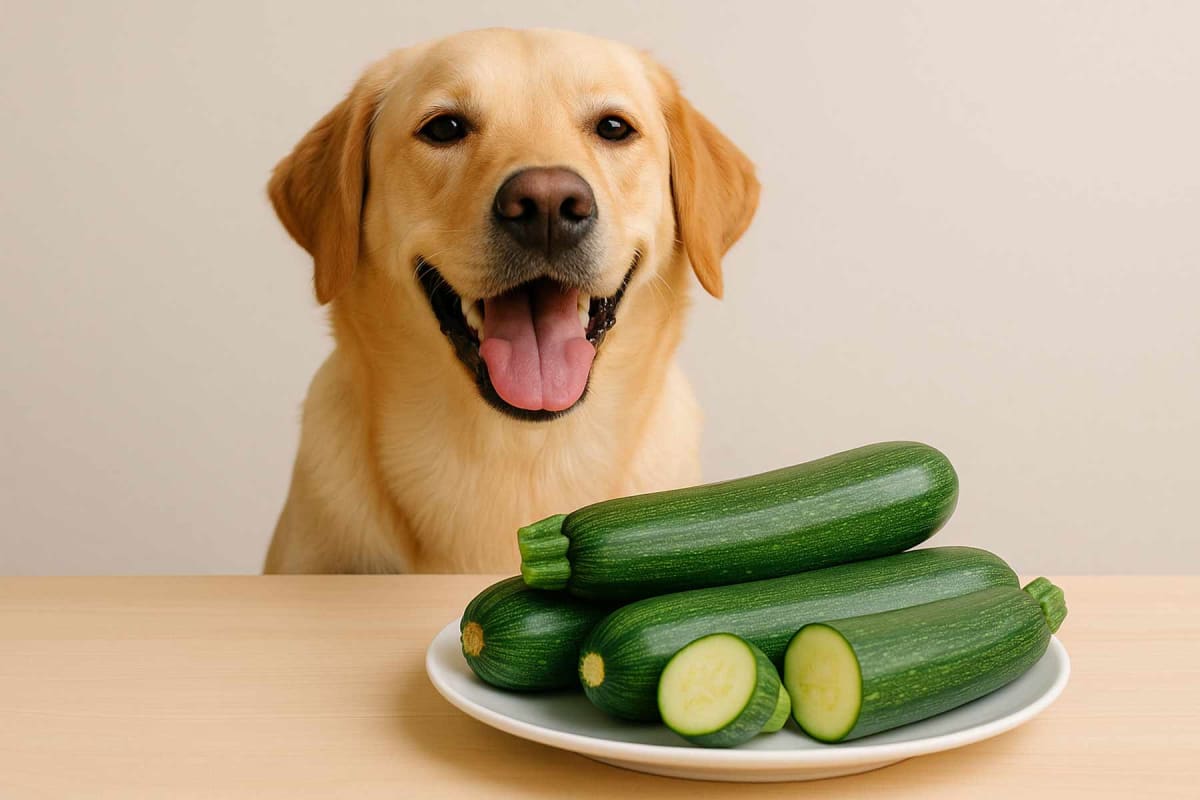
Can dogs eat zucchini?
Can dogs eat zucchini?
Can dogs have zucchini?
Yes, dogs can eat zucchini! In appropriate amounts, this versatile summer squash is safe for your canine companion and can be a healthy addition to their diet. Zucchini is non-toxic to dogs and is one of the safer vegetables you can share with your pet, as all parts of the plant are safe.
Is zucchini good for dogs?
Zucchini isn't just safe—it's actually beneficial for your four-legged friend. This nutrient-packed green vegetable (though technically a fruit) is low in calories and high in fiber, making it an excellent choice for dogs who need to maintain or lose weight.
Zucchini contains valuable vitamins and minerals including:
Vitamin A for eye health and immune function
Vitamin C for immune support and anti-inflammatory benefits
Potassium for heart and muscle function
Folate for cell function and tissue growth
Antioxidants that help fight inflammation
The high water content in zucchini (about 95%) also helps keep your dog hydrated, which is particularly beneficial during hot summer months. Plus, the fiber can aid in digestion and help maintain regular bowel movements.
Can dogs eat raw zucchini?
Yes, dogs can eat raw zucchini, but there are some considerations to keep in mind:
Pros: It is crunchy and can be a refreshing snack, especially in summer. Some dogs enjoy the texture, which can also help clean their teeth.
Cons: Raw zucchini can be more difficult for some dogs to digest than cooked zucchini. If your dog has a sensitive stomach, consider lightly steaming or cooking the zucchini first to make it more digestible.
Always wash raw zucchini thoroughly to remove any pesticides or chemicals, especially if it's not organic. And while the skin is safe and nutritious, it can be tougher to digest, so for dogs with delicate digestive systems, peeled zucchini is best.
How to safely feed zucchini to your dog
When introducing zucchini to your dog's diet, follow these simple guidelines to ensure a safe and positive experience:
Start small: Begin with tiny pieces to see how your dog reacts, both in terms of taste preference and digestive tolerance.
Prepare it properly: Wash thoroughly and remove stems and ends. Cut into bite-sized pieces appropriate for your dog's size to prevent choking hazards.
Keep it plain: Do not add any salt, oil, spices, garlic, or onions, which can be harmful to dogs.
Consider cooking methods: Steaming, boiling, or baking without added oils or seasonings are the healthiest ways to prepare zucchini for your pup.
Monitor after feeding: Watch for any signs of digestive upset like vomiting or diarrhea, especially when first introducing zucchini to your dog.
How much zucchini can I give my dog?
Even with healthy foods like zucchini, moderation is key. Treat zucchini as a supplement to your dog's regular diet, not a replacement for balanced dog food. As a general guideline:
Small dogs: 1 to 2 teaspoons
Medium-sized dogs: 2 to 3 teaspoons
Large dogs: 1 to 3 tablespoons
Start with smaller amounts and increase gradually if your dog enjoys it and shows no adverse reactions.
When to avoid giving zucchini to your dog
While zucchini is generally safe, there are a few situations when you might want to avoid it:
If your dog has a known food sensitivity or allergy to zucchini or similar vegetables
If the zucchini has been fried or prepared with ingredients harmful to dogs like onions, garlic, or excessive salt
If your dog is experiencing digestive issues
Always consult with your veterinarian if you're unsure about introducing new foods to your dog's diet, especially if they have existing health conditions.

Other safe vegetables to share
If your dog enjoys zucchini, you might want to try introducing other vegetables dogs can eat safely, including:
Carrots: Great source of vitamin A and good for dental health
Green beans: Low-calorie, high-fiber option
Cucumber: Hydrating with minimal calories
Sweet potatoes (cooked): Rich in vitamins and minerals
Pumpkin (plain, not pie filling): Excellent for digestive health
Broccoli (in small amounts): Packed with nutrients but can cause gas
As with zucchini, always introduce new vegetables slowly and in small amounts to monitor how your dog responds.